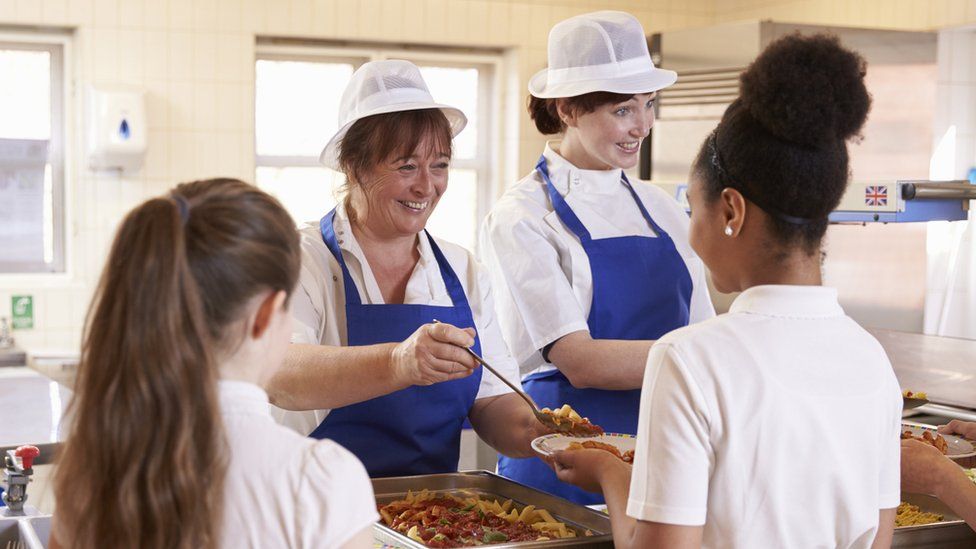
Planned strike action affects school catering, cleaning, janitorial, admin and classroom assistance staff
Unison has said strikes that will close schools across Scotland are going ahead despite last-ditch talks over the weekend.
Its members will strike across 24 council areas for three days from Tuesday in a dispute over pay, after rejecting Cosla’s last offer.
However, the Unite and GMB unions said they were suspending their strikes while their members were consulted.
It means there will not be any strikes in Falkirk or North Lanarkshire.
Unite and GMB members in many other areas could face the prospect of having to cross Unison picket lines.
The dispute is over a pay offer for non-teaching school staff including janitors and canteen workers.
‘Absolute last resort’
Mark Ferguson, Unison Scotland’s chair of local government, told the BBC the union had been in correspondence with local authority body Cosla over the weekend.
He said that strikes could not be averted unless “something really significant” came from councils.
He said: “It is the pay offer in itself but also there’s been decades of under funding in local government and we’ve got some sympathy for local authorities on that basis.
“Our members feel very strongly that the under investment in local government, they’re having to pick up the pieces of that and what they don’t want is our communities suffering any further.
“Our members don’t want to take industrial action – this is an absolute last resort. I’m a parent myself. But if we don’t take a stand then the longer-term impact on our children is going to get far worse with the cuts.”
The vast majority of schools in the 24 areas are expected to close if the Unison strike action goes ahead, although the picture is varied across the country and some secondary schools have said they will open to senior pupils.
A deadline was set for Wednesday last week for local authority body Cosla to make an improved pay offer – this was extended while it sought money from the deputy first minister.
The Scottish government then freed up £80m in ring-fenced funding to enable a new deal, which included a rise of about £2,000 a year for the lowest paid.
The total funding package was understood to be nearly £580m – although it involves no extra money for councils overall.
The ‘new’ money for pay would previously have been used for something else within the council budgets.
Previously the Scottish government had said councils would need to use existing budgets to fund a better deal.
After the latest offer was rejected, Deputy First Minister Shona Robison called for talks to continue to try and avert future strikes.
Mr Ferguson said Unison wanted the Scottish government to “bring new money to the table and fund a property deal our members can accept”.
Where are strikes being held?
Unison has rejected the new pay offer and will strike in schools in these 24 areas on Tuesday, Wednesday and Thursday of next week:
Aberdeen City, Aberdeenshire, Angus, Clackmannanshire, Comhairle nan Eilean Siar, Dumfries and Galloway, Dundee City, East Dunbartonshire, East Renfrewshire, Edinburgh City, Fife, Glasgow City, Highland, Inverclyde, Moray, North Ayrshire, Orkney, Perth and Kinross, Renfrewshire, Shetland, South Ayrshire, South Lanarkshire, Stirling, West Dunbartonshire,
The GMB has called off strikes in these 10 areas:
Aberdeen City, Clackmannanshire, Comhairle nan Eilean Siar, Dundee City, East Dunbartonshire, Falkirk, Glasgow City, Orkney, Renfrewshire, South Ayrshire,
Unite has called off strikes in these 11 areas:
Clackmannanshire, Comhairle nan Eilean Siar, Dundee City, East Dunbartonshire, East Renfrewshire, Fife, Glasgow City, Inverclyde, North Lanarkshire, Orkney, South Lanarkshire.
Further details of school closures are available on council websites.
On Saturday, the National Parent Forum of Scotland, a body representing parents and carers, said it recognised the right to fair pay and better conditions.
However, it said it was disappointed that talks had broken down.
In a statement, it said: “Yet again it’s families, children and young people at the centre who are detrimentally impacted across Scotland in a variety of ways.
“This again highlights the inequality of educational attainment across Scotland, as for many these three days will not be able to be ‘caught up’ and instead increase an existing gap in learning.”








